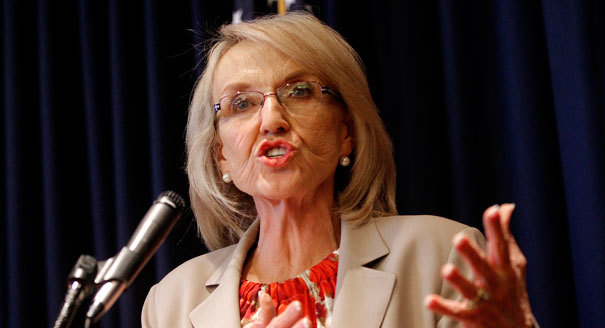Arizona approved the Medicaid expansion under President Obama’s law after Republican Gov. Jan Brewer put increasing pressure on state lawmakers to pass the bill. The expansion is expected to cost the state hundreds of millions of dollars and has already given rise to challenges questioning the constitutionality of the move.
Brewer had vowed to veto any legislation on her desk until Congress passed the Medicaid expansion—and she stood by the threat, killing four unrelated bills. The expansion passed the Arizona House with a simple 33-27 majority, after Brewer called a last-minute special session on June 11, which lasted till nearly 4 a.m.
“I used to say we were a pretty freedom-loving state,” said Christina Sandefur, attorney for the Scharf-Norton Center for Constitutional Litigation at the Goldwater Institute. “Our governor and legislature have really let us down. They’ve gone to great lengths to pass this thing, because there are a lot of people here who are against it.”
‘Bullied by This Governor’
“There are a lot of very principled people in our legislature, but they got bullied by this governor. I think that’s what’s going on here,” Sandefur said.
Senate President Andy Biggs and House Speaker Andy Tobin, both Republicans, blasted Brewer’s tactics.
“The special session was called without any consultation with Senate or House leadership, and was designed to commence at the precise moment it was conveyed. We are disappointed and stunned that the governor and her staff would resort to such an unnecessary, impulsive, and unprecedented tactic,” they said in a statement. “Instead of allowing the process to proceed in an orderly manner, the governor made the impetuous decision to intercede and collude with the Democrat minority in order to force an expedited vote on her sole legislative priority of Obamacare.”
Rep. John Kavanagh (R-Scottsdale) said the expansion was a wrongheaded move.
“It means that Arizona will now be contributing to the bankrupting of the U.S. government, and also it puts us at extreme [financial] risk, … and the burden will fall fully on the Arizona general fund,” said Kavanagh. “In the short run, Arizona gains because it is free money, but the federal government running trillion-dollar-plus deficits each year, clearly it’s not free to U.S. taxpayers who are footing the bill.”
Legal Challenges to Expansion
Regardless of the politics of Brewer’s method of achieving passage, the process by which the expansion became law involved some “serious constitutional problems,” Sandefur said.
The Arizona constitution requires that two-thirds of both legislative houses approve any increase in state taxes or fees, she said. The only exceptions to this are fees set entirely by a program administrator—for example, university tuition.
The provider tax, which will fund the state portion of the increased expenses, is a tax, and a 33-27 vote in the House doesn’t cut it, Sandefur said.
“Proponents of Medicaid expansion seem to think this doesn’t apply to them,” she said. “They don’t distinguish between those [hospitals] that receive Medicaid patients and those that don’t. That’s exactly what we think of as a tax: hospitals can’t avoid it and they don’t get anything in return, except if they don’t pay it they’re no longer licensed to practice in Arizona.”
In addition, the move blurs lines between the government’s branches, and separation of powers is more explicitly outlined in Arizona’s constitution than in the national one. The legislature gave taxing authority to the Medicaid administrator without any guidelines.
“He can decide if he wants it to be a bed tax or a flat tax or a percent of revenue; that’s in his hands to decide. We know it’ll be levied on hospitals, but we don’t know for sure how it will be levied,” Sandefur said.
The administrator is free to play political favorites and is likely to exempt those hospitals with large lobbying groups who have threatened to pull support, Sandefur noted.
Funding Questions
With the expansion in place, more Arizonans will be eligible for Medicaid. For the first three years, the federal government will send tax dollars to cover all medical expenses for newly eligible Arizonans, but not for increased administrative costs estimated at $154 million in the first year, said Christina Corieri, health care policy analyst for the Goldwater Institute.
The state’s share of the Medicaid expansion increases after the three years, and a Kaiser Family Foundation estimate shows the state paying up to an additional $739 million for 2014-2019.
Corieri prepared a fact sheet, showcasing what she characterizes as the irresponsibility of the expansion, for the state’s legislators. Among the highlights were President Obama’s two budget proposals that included cutting funding for the expansion.
“It’s unwise for Arizona to trust that the funding will be available,” Corieri said.
Citizen Effort for Suspension
Arizona citizens are already mustering forces to collect some 80,000 signatures needed to suspend the law until it is put on the next general election ballot in November 2014. Arizona laws go into effect 90 days after they pass, giving citizens an opportunity to gather opposition if they aren’t happy.
Sandefur said the signatures will likely face scrutiny from those who support the expansion, but she expects to see the measure on the November ballot next year.
“Most Arizonans are not in favor of Obamacare and not in favor of increased government expansion in medicine and in the medical fields,” she said.




